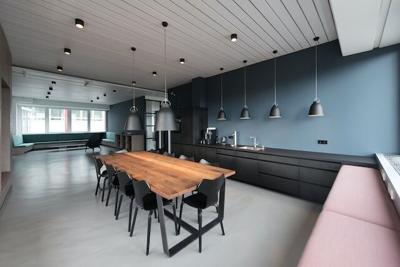
The kitchen is often thought of as the heart of the home, but it can also play an important role in the workplace. A well-designed and equipped kitchen can contribute to employee satisfaction, productivity, and overall well-being. In this article, we will explore the importance of kitchens in workplaces, including the benefits of providing employees with access to a kitchen, the design and layout of a workplace kitchen, and the equipment and amenities that should be included.
Access to a Kitchen
Providing employees with access to a kitchen can have a number of benefits. For one, it can save employees time and money by allowing them to prepare their own meals and snacks, rather than relying on fast food or vending machines. Additionally, it can promote healthier eating habits, which can improve employee well-being and productivity. A kitchen also allows employees to take a break from their office workstations, socialize and bond with their colleagues, which can improve employee morale and relationships.
Design and Layout
The design and layout of a workplace kitchen are also important. A kitchen should be well-organized and easy to navigate, with ample cafe tables and storage for food and kitchen equipment. Additionally, it should be easy to clean and maintain, and it should be equipped with the necessary appliances and equipment, such as a refrigerator, microwave, and sink.
Equipment and Amenities
When it comes to equipment and amenities, a workplace kitchen should include all the basics, such as a refrigerator, microwave, and sink. Additionally, it should also include basic cookware and utensils, such as pots and pans, plates, and silverware. Amenities such as a coffee machine or water cooler can also be a great addition to the kitchen.
Safety
Safety is an important aspect of workplace kitchen design. This includes ensuring that the kitchen is equipped with fire extinguishers and smoke detectors, as well as providing employees with proper training on kitchen safety and emergency procedures. Additionally, it's important to ensure that the kitchen is clean and well-maintained, to prevent food-borne illnesses and accidents.
Sustainability
Sustainability is also an important aspect of workplace kitchen design. This includes choosing energy-efficient appliances and equipment, as well as using sustainable materials, such as bamboo or recycled plastic, for countertops and cabinets. Additionally, providing recycling and composting options in the kitchen can also promote sustainability and reduce waste.
Kitchens play an important role in the workplace by providing employees with access to a place to prepare their own meals, promoting healthier eating habits, and creating a space for employees to socialize and bond. A well-designed and equipped kitchen can contribute to employee satisfaction, productivity, and overall well-being. This includes providing a safe, clean, and easy to navigate space, with proper equipment and amenities, and promoting sustainability through the use of energy-efficient appliances and sustainable materials.
Here are Some Other Articles Related to Your Search:
- 6 Tips For Designing The Kitchen of Your Dreams
- Work Smarter In A Garden Office
- Hygge Home Office – Cosy Productivity


(0) comments
We welcome your comments
Log In
Post a comment as Guest
Keep it Clean. Please avoid obscene, vulgar, lewd, racist or sexually-oriented language.
PLEASE TURN OFF YOUR CAPS LOCK.
Don't Threaten. Threats of harming another person will not be tolerated.
Be Truthful. Don't knowingly lie about anyone or anything.
Be Nice. No racism, sexism or any sort of -ism that is degrading to another person.
Be Proactive. Use the 'Report' link on each comment to let us know of abusive posts.
Share with Us. We'd love to hear eyewitness accounts, the history behind an article.